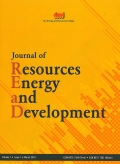Authors: Akinwumi, I O | Obioh, I B | Momodu, A S | Akinbami, J-F K
Article Type:
Research Article
Abstract:
Globally, energy consumption is projected to grow, with the major increase expected in developing countries, including Nigeria. Bio-energy sources accounted for 60% of the total final energy consumption in Nigeria, of which 85% was utilized by the household sector, in 2000. The effect of technology intervention on household energy mix in Nigeria was examined for a 30-year period by using four different economic development scenarios. These consist of the baseline scenario, NEEDS (National Economic Empowerment and Development Strategy) Baseline, or N_BS, and three technology intervention scenarios, namely, NEEDS Trend Scenario, or N_TS, NEEDS Action Scenario, or N_AOS, and Non-NEEDS Scenario,
…or N-NS. The study was carried out for different ecological zones, namely, forest and savanna. Longrange Energy Alternatives Planning, or LEAP, system, an energy simulation model, was employed for the analysis of the study. Lower and upper limits of the cost of technology intervention are $17.40 billion and $39.20 billion for N_BS and N-NS, respectively. The final energy demand dropped by about 47%, 55%, and 64% for the three intervention scenarios, namely, N_TS, N_AOS, and N-NS, respectively. Environmental implications, in terms of GHG (greenhouse gas) savings, are savings of 1.5 billion kg of C equivalent, and the avoided cost is about –$0.11 million/tonne of C equivalent, which actually represents benefit. Cumulative GHG emission per capita at about 690 kg CO2 equivalent was highest for N_BS in 2030, with the least emission occurring for N-NS for the same time period, at 550 kg CO2 equivalent. The final energy intensity for the country’s household sector was estimated to be 50.96 GJ/annum. With a technology intervention that is more efficient than the current trend and provides better alternatives for cooking energy, this figure is expected to drop appreciably over the 30-year time frame of the analysis. However, the immediate contending issues for household energy use in Nigeria are ensuring accessibility to energy sources in terms of availability and affordability, and enabling the rural populace and urban poor to achieve a sustainable path for national economic growth and development.
Show more
DOI: 10.3233/RED-120057
Citation: Journal of Resources, Energy and Development,
vol. 6, no. 1, pp. 23-43, 2009
Price: EUR 27.50






